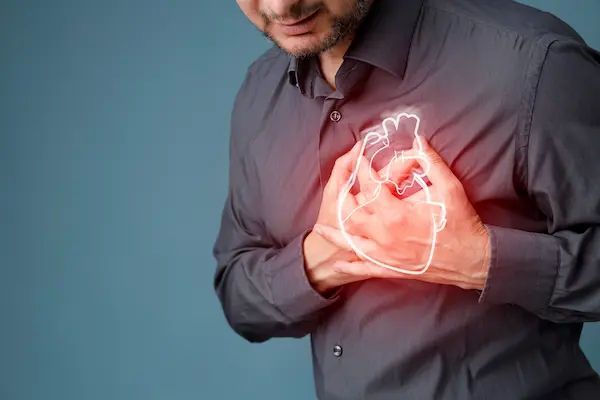A Practical Guide to Reducing the Risk of Heart Disease
Learn practical, science-backed ways to reduce your risk of heart disease through healthy eating, regular exercise, stress management, and lifestyle changes.


Introduction
Heart disease isn't just a single condition; it's a term that covers a range of issues affecting your heart and blood vessels. While it remains a leading cause of death globally, the most empowering fact is that it's largely preventable. This guide is designed to demystify heart disease and give you a clear, actionable roadmap to significantly lower your personal risk. You don't need drastic overnight changes. Instead, we'll focus on sustainable shifts in your daily habits—what you eat, how you move, and how you manage stress—that collectively build a powerful defense for your cardiovascular system. By understanding the key factors within your control, you can take proactive steps today to ensure a stronger, healthier heart for years to come. Let's explore the science-backed strategies that can help you build a resilient heart.
Understanding Heart Disease: The Silent Threat
What is Cardiovascular Disease?
Cardiovascular disease (CVD) often begins with atherosclerosis, a process where plaque—made of fat, cholesterol, and other substances—builds up inside your arteries. This buildup narrows the arteries, making it harder for blood to flow through. If a plaque ruptures, it can form a clot that blocks blood flow entirely, leading to a heart attack or stroke. Other forms of heart disease include heart failure, irregular heartbeats (arrhythmias), and heart valve problems. Understanding this underlying mechanism is the first step in cardiovascular health prevention.
The Power of Prevention: It's Never Too Early or Too Late
Many people believe that if heart disease runs in their family, their fate is sealed. This is a dangerous misconception. While genetics play a role, lifestyle factors are overwhelmingly influential. Research consistently shows that up to 80% of premature heart disease and stroke can be prevented through lifestyle choices. Whether you're 25 or 65, the choices you make today can slow the progression of atherosclerosis, improve the function of your blood vessels, and dramatically reduce your risk. Prevention is a lifelong journey, and every positive change counts.
Consult a Cardiologist for the best advice
Know Your Numbers: The Controllable Risk Factors for Heart Disease
You can't manage what you don't measure. Three critical numbers provide a snapshot of your heart disease risk: blood pressure, cholesterol, and blood sugar. Regular check-ups are essential. If you need to get these levels checked, Apollo24|7 offers a convenient home collection for tests like lipid profile and HbA1c.
Blood Pressure: The Silent Force
Hypertension, or high blood pressure, is often called the "silent killer" because it typically has no symptoms. It forces your heart to work much harder to pump blood, damaging your arteries over time. A normal reading is less than 120/80 mm Hg. Lifestyle changes like reducing sodium intake, exercising, and managing stress are key to control. If your numbers remain high despite lifestyle adjustments, it's crucial to consult a doctor. You can consult a doctor online with Apollo24|7 to discuss your readings and create a management plan.
Cholesterol: The Good, The Bad, and The Ugly
Cholesterol is a waxy substance your body needs, but too much of the wrong kind is problematic. Low-density lipoprotein (LDL) is "bad" cholesterol that contributes to plaque. High-density lipoprotein (HDL) is "good" cholesterol that helps remove LDL from your arteries. High LDL cholesterol and triglyceride levels are significant risk factors. A heart-healthy diet low in saturated and trans fats is your first line of defense.
Blood Sugar and Diabetes
Consistently high blood sugar levels can damage blood vessels and the nerves that control your heart. People with diabetes are twice as likely to have heart disease or a stroke. Preventing or managing type 2 diabetes through diet, exercise, and maintaining a healthy weight is a cornerstone of cardiovascular health.
Lifestyle as Medicine: Your Daily Defence Against Heart Disease
Fueling Your Heart: A Heart-Healthy Diet Plan
What you eat has a direct impact on your artery health. The goal isn't a short-term "diet" but a sustainable eating pattern, like the Mediterranean diet, which is rich in fruits, vegetables, whole grains, and healthy fats.
Foods to Embrace: The Heart's Best Friends
To keep your heart strong and healthy, focus on adding these nutrient-rich foods to your daily diet:
• Fruits and Vegetables: Packed with fibre, antioxidants, and potassium, which help lower blood pressure.
• Whole Grains: Oats, quinoa, and brown rice provide soluble fibre that helps reduce LDL cholesterol.
• Healthy Fats: Found in avocados, nuts, seeds, and olive oil, these unsaturated fats can help improve cholesterol levels.
• Fatty Fish: Salmon, mackerel, and sardines are rich in omega-3 fatty acids, which reduce inflammation and triglycerides.
Foods to Limit: Reducing the Enemy's Rations
To protect your heart and maintain healthy blood vessels, try to cut back on the following foods:
• Processed Foods: Often high in sodium, unhealthy fats, and refined sugars.
• Sugary Drinks: A major source of empty calories that contribute to weight gain and diabetes.
• Red and Processed Meats: High in saturated fats and sodium. Opt for lean protein sources like poultry, fish, and legumes.
Get Moving: How Exercise Strengthens Your Heart
Regular physical activity is one of the most effective ways to lower risk of heart attack. Aim for at least 150 minutes of moderate-intensity exercise (like brisk walking, cycling, or swimming) per week. Exercise helps control weight, improves cholesterol, lowers blood pressure, and reduces stress.
The Weight Connection: Achieving and Maintaining a Healthy BMI
Carrying excess weight, especially around the abdomen, strains your heart and contributes to high blood pressure, high cholesterol, and diabetes. Even a modest weight loss of 5-10% of your body weight can produce significant benefits for your cardiovascular health.
Butt Out: Why Quitting Smoking is Non-Negotiable
Smoking is one of the most significant risk factors for heart disease. The chemicals in tobacco damage the heart and blood vessels, leading to narrowed arteries. The good news? Your risk of heart disease drops dramatically within just one year of quitting.
Taming the Stress Beast for a Healthier Heart
Chronic stress can lead to behaviours that increase heart disease risk, such as overeating, poor sleep, and physical inactivity. It can also raise blood pressure. Finding healthy outlets like meditation, yoga, deep breathing exercises, or spending time in nature is crucial for stress management.
The Overlooked Factor: Prioritising Quality Sleep
During sleep, your body repairs itself. Consistently getting less than 7 hours of quality sleep is linked to an increased risk of hypertension, obesity, and diabetes. If you snore loudly or feel tired after a full night's sleep, you might have sleep apnea, a serious condition that requires medical attention.
Conclusion: Taking the First Step
Reducing your risk of heart disease is not about perfection; it's about progression. The journey to better cardiovascular health is built one small, consistent choice at a time. Start by incorporating one positive change from this guide—perhaps adding a vegetable to your dinner or taking a 15-minute walk. Celebrate these small victories. Remember, you have immense power to influence your heart's future through the daily habits you cultivate. Be patient with yourself, stay consistent, and don't hesitate to seek support from healthcare professionals. If you have concerns about your heart disease risk or need help managing conditions like hypertension, consulting a doctor is the most important step you can take. Your heart is your most vital muscle; nourish it, move it, and protect it for a long and vibrant life.
Consult a Cardiologist for the best advice
Consult a Cardiologist for the best advice

Dr. Anand Ravi
General Physician
2 Years • MBBS
Bengaluru
PRESTIGE SHANTHINIKETAN - SOCIETY CLINIC, Bengaluru

Dr. Sumanjita Bora
Cardiologist
9 Years • MBBS, PGDCC
Bengaluru
Apollo Clinic, Sarjapur Road, Bengaluru

Dr. Zulkarnain
General Physician
2 Years • MBBS, PGDM, FFM
Bengaluru
PRESTIGE SHANTHINIKETAN - SOCIETY CLINIC, Bengaluru

Dr. Tripti Deb
Cardiologist
40 Years • MBBS, MD, DM, FACC, FESC
Hyderabad
Apollo Hospitals Jubilee Hills, Hyderabad

Dr. Prashant Adeppa
Cardiologist
10 Years • MBBS, MD General Medicine, DM Cardiology (Armed Forces Medical College)
Bengaluru
Apollo Hospitals Bannerghatta Road, Bengaluru
Consult a Cardiologist for the best advice

Dr. Anand Ravi
General Physician
2 Years • MBBS
Bengaluru
PRESTIGE SHANTHINIKETAN - SOCIETY CLINIC, Bengaluru

Dr. Sumanjita Bora
Cardiologist
9 Years • MBBS, PGDCC
Bengaluru
Apollo Clinic, Sarjapur Road, Bengaluru

Dr. Zulkarnain
General Physician
2 Years • MBBS, PGDM, FFM
Bengaluru
PRESTIGE SHANTHINIKETAN - SOCIETY CLINIC, Bengaluru

Dr. Tripti Deb
Cardiologist
40 Years • MBBS, MD, DM, FACC, FESC
Hyderabad
Apollo Hospitals Jubilee Hills, Hyderabad

Dr. Prashant Adeppa
Cardiologist
10 Years • MBBS, MD General Medicine, DM Cardiology (Armed Forces Medical College)
Bengaluru
Apollo Hospitals Bannerghatta Road, Bengaluru
More articles from Heart disease
Frequently Asked Questions
1. What are the early warning signs of heart disease?
Early signs can be subtle. Look out for chest discomfort (pressure, squeezing, or pain), shortness of breath, pain in the jaw, neck, back, or arms, unexplained nausea, or extreme fatigue. However, heart disease can be silent, so regular check-ups are vital.
2. Can you reverse heart disease with lifestyle changes?
While you may not fully 'reverse' advanced plaque buildup, aggressive lifestyle changes can halt its progression, stabilise plaque, and significantly improve blood vessel function. This can effectively reduce symptoms and the risk of heart attacks.
3. What is the best exercise for heart health?
A combination of aerobic exercises (walking, running, swimming) and strength training is ideal. Aerobic activity strengthens the heart muscle itself, while strength training improves overall metabolism and helps with weight management.
4. How does stress directly cause heart problems?
Chronic stress leads to elevated cortisol and adrenaline levels, which can increase blood pressure, heart rate, and inflammation. It can also lead to unhealthy coping mechanisms like poor diet and smoking, which compound the risk.
5. Are eggs bad for your heart because of cholesterol?
For most people, moderate egg consumption (up to one egg per day) is not associated with an increased risk of heart disease. The focus should be on limiting saturated and trans fats from processed foods and fried items, which have a greater impact on blood cholesterol.




